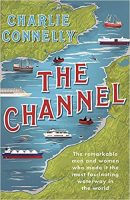 Restrictions are being eased and bookshops opening, but literary sections are slimmer than they were and reviews fewer, and launches are still down virtual slipways. The writer and broadcaster Charlie Connelly, author of Attention All Shipping: A Journey Round the Shipping Forecast, will be taking to Facebook tonight to introduce his latest book: The Channel: The remarkable men and women who made it the most fascinating waterway in the world (Weidenfeld & Nicolson).
Restrictions are being eased and bookshops opening, but literary sections are slimmer than they were and reviews fewer, and launches are still down virtual slipways. The writer and broadcaster Charlie Connelly, author of Attention All Shipping: A Journey Round the Shipping Forecast, will be taking to Facebook tonight to introduce his latest book: The Channel: The remarkable men and women who made it the most fascinating waterway in the world (Weidenfeld & Nicolson).
In his first chapter, he visits three concrete sculptures facing the sea at Denge, in Kent: two giant scallop shapes and a long concrete wall. They were built in the late 1920s and early ’30s, in the days before radar, and designed to pick up the sound of approaching aircraft or artillery. Though now redundant, they are, he says, “still listening to the English Channel, still picking up its stories”. Since he moved to live in Deal, at the mouth of the Channel, his own antennae have become similarly tuned to this narrow strip of sea that separates Britain from Europe and which has been a shipping lane, a barrier to invasion and a challenge to be conquered.
Join him on his journeys, the jacket promises, and you will uncover the tragic fate of the first successful Channel swimmer, learn that Louis Blériot was a terrible pilot, and “discover how — if a man with buttered head and pigs’ bladders attached to his trousers hadn’t fought off an attack by dogfish — we might never have had a Channel Tunnel”.
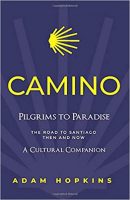 Thanks to coronavirus, fewer pilgrims have been tramping this year across Europe to Santiago in northern Spain, to the supposed tomb of the apostle St James. If you have had to postpone a trip, or you’re still planning one, Camino: Pilgrims to Paradise by Adam Hopkins (through Amazon) ought to be on your reading list.
Thanks to coronavirus, fewer pilgrims have been tramping this year across Europe to Santiago in northern Spain, to the supposed tomb of the apostle St James. If you have had to postpone a trip, or you’re still planning one, Camino: Pilgrims to Paradise by Adam Hopkins (through Amazon) ought to be on your reading list.
Hopkins, a journalist who has long specialised in Spain (and is now living in the rural west), has been walking “The Way” in spring and autumn for three decades, sometimes with his wife, sometimes as a tour leader. In this new cultural companion he looks into “the force of the legends and the vehemence of the beliefs” associated with the Camino; shows how the walk became central to Christian pilgrimage; and, drawing on his own experience, paints a vivid picture of what happens on the road here and now. Motivations are as numerous as the pilgrims (more than 300,000 in 2019), and while many are still intent on quest, quietness and meditation, there’s the odd one plotting a stock-market takeover.
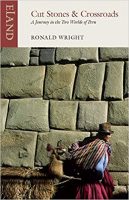 Ronald Wright is an English-born writer who went to Canada as a graduate student of archaeology and stayed on. He is best known, perhaps, for his fiction (he won the David Higham Prize in 1997 with his first novel, A Scientific Romance, which his publishers bill as a story of “love, plague and time travel”), but his early books were travel books, and two grew out of his interest in the native civilisations of the Americas. Cut Stones and Crossroads: A Journey in the Two Worlds of Peru (first published in 1984) and Time Among the Maya: Travels in Belize, Guatemala and Mexico (1989), are due to be reissued next month (July 23) by Eland, that loving caretaker of travel classics. (Eland will add his third travel book, On Fiji Islands, in October.)
Ronald Wright is an English-born writer who went to Canada as a graduate student of archaeology and stayed on. He is best known, perhaps, for his fiction (he won the David Higham Prize in 1997 with his first novel, A Scientific Romance, which his publishers bill as a story of “love, plague and time travel”), but his early books were travel books, and two grew out of his interest in the native civilisations of the Americas. Cut Stones and Crossroads: A Journey in the Two Worlds of Peru (first published in 1984) and Time Among the Maya: Travels in Belize, Guatemala and Mexico (1989), are due to be reissued next month (July 23) by Eland, that loving caretaker of travel classics. (Eland will add his third travel book, On Fiji Islands, in October.)
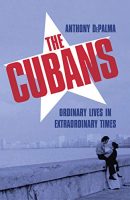 Anthony DePalma worked for 22 years as a journalist on The New York Times, much of that time in Mexico and Cuba. In The Man Who Invented Fidel, he examined how Castro had come to power. In The Cubans: Ordinary Lives in Extraordinary Times (Bodley Head, July 16), he tells how five Cuban citizens and their families have lived through the moments that made headlines. Unlike Castro, he says, whose millions of words have been broadcast and regularly replayed, these people have never been heard from. “But it is their complicated lives, their personal histories of living with an interminable revolution… that tell the remarkable story of Cuba best.” The book appeared in the United States in May, and has won praise from reviewers in publications including The New York Times and the Harvard magazine ReVista.
Anthony DePalma worked for 22 years as a journalist on The New York Times, much of that time in Mexico and Cuba. In The Man Who Invented Fidel, he examined how Castro had come to power. In The Cubans: Ordinary Lives in Extraordinary Times (Bodley Head, July 16), he tells how five Cuban citizens and their families have lived through the moments that made headlines. Unlike Castro, he says, whose millions of words have been broadcast and regularly replayed, these people have never been heard from. “But it is their complicated lives, their personal histories of living with an interminable revolution… that tell the remarkable story of Cuba best.” The book appeared in the United States in May, and has won praise from reviewers in publications including The New York Times and the Harvard magazine ReVista.
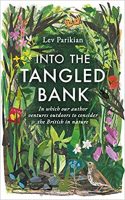 The restrictions we’ve had to live with since the end of March have made many people more appreciative of the world outside their windows; of skies clear of jet contrails during the day and mad with stars at night. The conductor and writer Lev Parikian had got his eye in well before lockdown started. He rediscovered his childhood passion for birding in middle age, and wrote a book about it, Why Do Birds Suddenly Disappear?. Birding made him look more closely at the natural world in general, and how others interact with it. In Into the Tangled Bank (Elliott & Thompson, July 9), he sets out to explore the way that he, and we, experience that world, “beginning face down on the pavement outside his home, then moving outwards from garden to wildlife reserve and as far afield as the dark hills of Skye. He visits the haunts of famous nature lovers… to examine their insatiable curiosity and follow in their footsteps.”
The restrictions we’ve had to live with since the end of March have made many people more appreciative of the world outside their windows; of skies clear of jet contrails during the day and mad with stars at night. The conductor and writer Lev Parikian had got his eye in well before lockdown started. He rediscovered his childhood passion for birding in middle age, and wrote a book about it, Why Do Birds Suddenly Disappear?. Birding made him look more closely at the natural world in general, and how others interact with it. In Into the Tangled Bank (Elliott & Thompson, July 9), he sets out to explore the way that he, and we, experience that world, “beginning face down on the pavement outside his home, then moving outwards from garden to wildlife reserve and as far afield as the dark hills of Skye. He visits the haunts of famous nature lovers… to examine their insatiable curiosity and follow in their footsteps.”

Leave a Reply